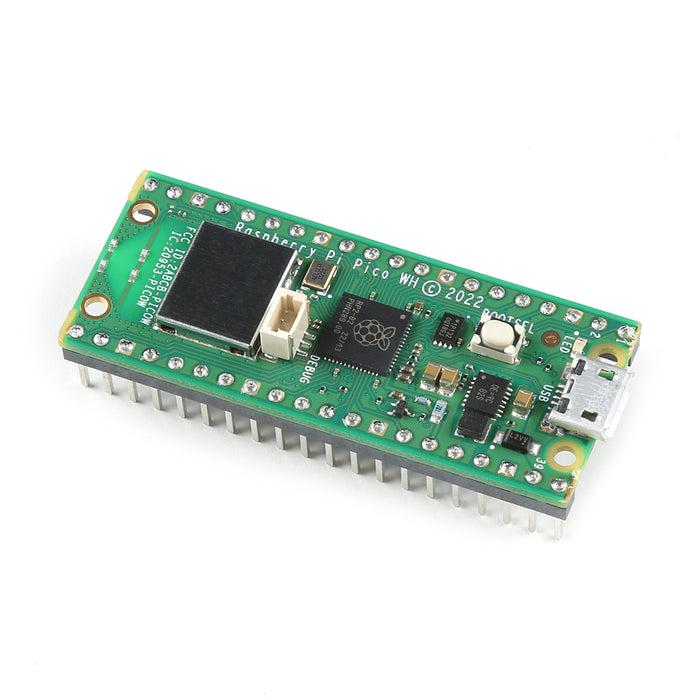
Raspberry Pi Pico WH
We have ✅ 20 available of the RP-SC0919 in our Sydney warehouse. An extra 214 units available with a short lead time.
The Raspberry Pi Pico W builds upon the great cost-for-performance metrics of the Pico and add WiFi to the board. The Pico W features the same attributes as the Raspberry Pi Pico and also incorporates an Infineon CYW43439 wireless chip. CYW43439 supports IEEE 802.11 b/g/n wireless LAN, and Bluetooth® 5.2, supporting Bluetooth® Classic and Bluetooth® Low Energy (BLE) functionality - with the temporary exception of ACL/SCO — along with both the BLE Central and Peripheral roles. Things are also configurable so you can enable Bluetooth® Classic and BLE either individually, or have both of them available at the same time.
The Raspberry Pi Pico line is a low-cost, high-performance microcontroller board with flexible digital interfaces. It feature the RP2040 which marks Raspberry Pi's first microcontroller designed in-house. Pico provides minimal (yet flexible) external circuitry to support the RP2040 chip (Flash, crystal, power supplies and decoupling and USB connector). The majority of the RP2040 microcontroller pins are brought to the user IO pins on the left and right edge of the board. Four RP2040 IO are used for internal functions - driving an LED, on-board Switched Mode Power Supply (SMPS) power control and sensing the system voltages.
Pico uses an on-board buck-boost SMPS which is able to generate the required 3.3 volts (to power RP2040 and externalcircuitry) from a wide range of input voltages (~1.8 to 5.5V). This allows significant flexibility in powering the unit from various sources such as a single Lithium-Ion cell, or three AA cells in series. Battery chargers can also be very easily integrated with the Pico powerchain. Reprogramming the Pico's flash memory can be done using USB (simply drag and drop a file onto the Pico which appears as a mass storage device) or via the Serial Wire Debug (SWD) port. The SWD port can also be used to interactively debug coderunning on the RP2040
Pico has been designed to use either soldered 0.1" pin-headers (it is one 0.1" pitch wider than a standard 40-pin DIP package) or can be used as a surface mountable "module", as the user IO pins are also castellated. There are SMT pads underneath the USB connector and BOOTSEL button, which allow these signals to be accessed if used as a reflow-soldered SMT module.
NOTE: This variation comes with a set of male headers pre-soldered to all through-hole vias (thus the Pico WH instead of just the Pico W). The spacing remains 2.54mm and breadboard compatible (even more so now with the addition of the male headers).
Features:
- RP2040 microcontroller chip designed by Raspberry Pi in the United Kingdom
- Dual-core ARM Cortex M0+ processor, flexible clock running up to 133 MHz
- 264kB of SRAM, and 2MB of on-board Flash memory
- Castellated module allows soldering direct to carrier boards
- USB 1.1 Host and Device support
- Low-power sleep and dormant modes
- Drag & drop programming using mass storage over USB
- 26 multi-function GPIO pins
- 2× SPI, 2× I2C, 2× UART, 3× 12-bit ADC, 16× controllable PWM channels
- Accurate clock and timer on-chip
- Temperature sensor
- Accelerated floating point libraries on-chip
- 8 × Programmable IO (PIO) state machines for custom peripheral support
- 0.1" Spaced Male Headers pre-soldered to the board
Documents:
Videos
The Raspberry Pi Pico WH appears in the following collections:
SKU RP-SC0919

